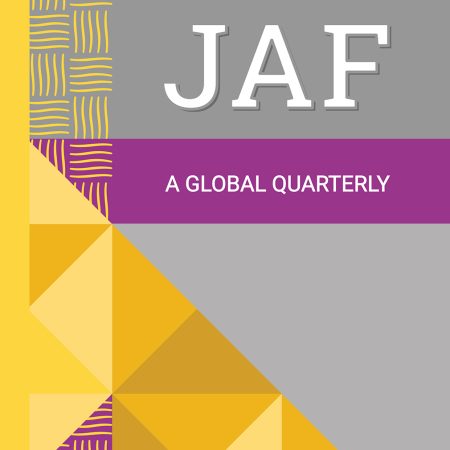Coming Soon: The JAF Summer Issue

The editors of the The Journal of American Folklore are pleased to announce the imminent shipment of the Summer issue (v. 135, no. 537) of JAF: A Global Quarterly. The issue will also soon be available online to subscribers in Project Muse.
Contributors to the Journal of American Folklore are starting to take advantage of the journal’s new sections and formats. We hope that this issue will encourage even more creative and innovative submissions.
The issue begins with Norma E. Cantú’s provocative 2021 American Folklore Society Presidential Address, “Paso a paso se va muy lejos: Traveling the Path with AFS.”
Two scholarly articles explore the relationships between narrative and the social and political contexts in which they are told or written. Gabriel Vertin McGuire’s “Trickster, Comrade, Citizen: The Adventures of Aldar Köse in Kazakh Folktales and Mass Culture” examines Motif K111.1, Alleged gold-dropping animal sold, in different Kazakh historical contexts to reveal “the ways in which a trickster figure who embodied a disorderly anarchy of appetite was improbably reborn as an apostle of order.” In “Subversion, Subservience, and Property in The Magic Bean and Iranian Fairy Tales Written in 1960–1980,” Roshanak Pashae traces variants of “The Magic Bean” fairytale, demonstrating how the tale type was adapted to express differing conceptions around property and ownership within the context of the Islamic Revolution of Iran.
Shirley Moody-Turner offers her second contribution to the new Engaging the Past section with “Gladys-Marie Fry’s Night Riders in Black Folk History: Critical Race Theory and Black Folklore Practice.” The Engaging the Past section was created in recognition that scholarship by authors of color, women, and other marginalized groups have not always received the attention they deserved. In addition, at times, there is renewed interest in debates or materials from past publication that makes republication valuable. Turner’s essay responds to both these efforts in that it brings our attention to Fry’s important scholarship and highlights the often-overlooked intersections between critical race theory and the critically-engaged scholarship of folklorists, especially BIPOC academic and public sector ones.
Tōru Mitsui’s Commentary, “Published Collections as the Sources of Ballad Tunes Sung by an Enthusiast in Japan,” is a delightful personal account about how ballads travel across time and space through individual initiative, recordings, song books, and accidental encounters.
The issue also includes numerous book reviews along with a film/video review.
The editors encourage readers and potential contributors to learn about the types of material JAF publishes.
If you have ideas or questions, please contact Editor-in-Chief Lisa Gilman at [email protected].
We sometimes make mistakes, and we are happy to correct any errors that you may come across on our site. If you find an error, please let us know using the “submit a correction” link.